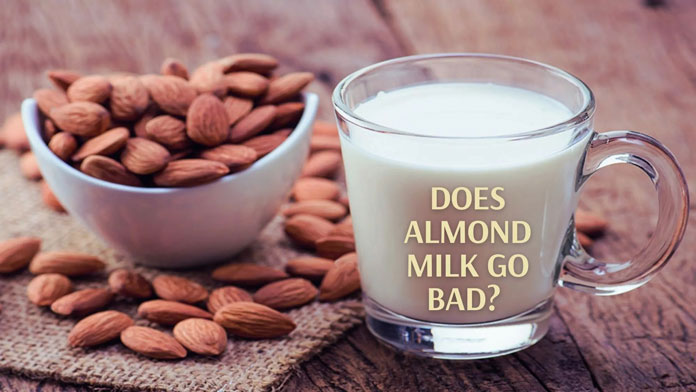Unlike diary milk which lasts a very short while before it goes bad, almond milk lasts a few days longer. It all depends on the processing in which the almond milk is obtained whether it is homemade, commercial or shelf-stable. But with proper storage and handling, you can use each drop of milk to the fullest extent.
When does almond milk go bad?
Almond milk typically lasts for 3-10 days after opening the carton. Homemade almond milk has a shorter shelf-life of 3 to 7 days, which is longer than store-bought varieties lasting 7 to 10 days.
When does refrigerated almond milk go bad?
Ultra-pasteurized almond milk found in stores usually lasts longer, especially if it is refrigerated. The pasteurization process goes as such: the milk is quickly heated to 280°F (138°C) to kill any existing bacteria and germs in the ingredients, and then quickly cooled down.
Keep it stored in the fridge and seal it tightly after every use so it lasts longer. You have about 7 days until it goes bad, for opening the container allows oxygen to enter. This will allow bacteria to breed.
When does homemade almond milk go bad?
If you are one to prefer homemade almond milk, then be aware as it starts to get funky around 3 to 7 days (when it starts to go bad, your batch of almond milk will become clumpy and begin to stink).
The main reason homemade almond milk doesn’t last as long as the store-bought variety is that it’s not pasteurized, therefore the bacteria found in the ingredients aren’t killed. The containers used also play a part, as containers that allow oxygen to get in will be a breeding ground for bacteria which makes your almond milk go bad.
For homemade almond milk, you may also notice that the ingredients tend to separate at times. But if you find that your batch is still fresh, shake the bottle or carton up to mix it up again!
Does almond milk go bad if not refrigerated?
The best way to make almond milk spoil is to leave it open without a fridge. Almond milk that has been left unrefrigerated for too long will start to attract bacteria, making it go bad quicker and making the consumer sick as well.
According to the United States Department of Agriculture (USDA), the recommended amount of leaving it out in room temperature conditions is not more than 2 hours.
When does shelf-stable almond milk go bad?
But for almond milk that stays fresh longer will be shelf-stable almond milk. This type of milk can be found refrigerated in supermarket shelves. What differentiates this type of almond milk is that it has been ultra-pasteurized and then sealed in a special packaging. It is therefore more durable than other types of almond milk, as it prevents the almond milk from spoiling when stored at room temperature. The milk stays sterile and no bacteria gets in.
Especiall for shelf-stable almond milk, unopened ones are still safe to drink for 4 to 6 weeks after the “sell by” or “best buy” date. But once opened, refrigeration is recommended ASAP. It’ll stay fresh for about 7 to 10 days.
But you still need to stay vigilent and monitor the milk. Make sure it’s not showing signs of going bad, and check the labels on the cartons for more specifics on how long it should last.
How to tell if almond milk has gone bad?
Even if it has already been a few days, there is no harm in checking signs of your batch of almond milk going bad. Once you find these signs in your almond milk, it’s time to bid adieau to the batch.
- Bloated carton. Once you notice that your unopened carton of almond milk is plump and bloated, there is a good chance that the milk inside had gone bad. Even if it is unopened, it is a clear sign that it has been contaminated.
- Weird smell. Fresh almond milk usually have a faint nutty smell, but once you notice unpleasant odors or the smell of sour milk, then it is likely that it has gone bad.
- Strange appearance. Homemade almond milk tends to separate, which can be solved by shaking the solution back to normal consistency. Lumps, weird textures, curdling or a strange consistency that can’t be solved by shaking are signs that your almond milk has probably gone bad. It’s time to throw it out.
- Molding. This is a definite sign that the almond milk has gone bad. Check for spots of specks of fungus, and throw it away once you find more signs that the milk has gone bad. However, tiny black spots on your batch of homemade milk could just be specks of almond skin. Despite that, it’s better not to take any chances and throw it out immediately.
- Funny taste. Fresh almond milk either tastes faintly nutty, sweet or with various flavorings depending on the type of brand you buy. Taste is also one of the indicators, and if you notice the taste odd or sour then it’s probably no longer good.
Wondering how to keep the almond milk fresh?
The rule is simple: store it like the store does.
Commercially bought almond milk bought from the store’s fridge section and homemade almond milk should be put in the fridge from the get-go. On the other hand, shelf-stable cartons could be put in the pantry or cupboard until ready for use. Yet once it is opened, it needs to be put in the fridge straight away.
As been explained in the paragraphs previous to this one, not storing the almond milk correctly can shorten shelf-life. Therefore, it’s important to be consistend with storing.
Try out these simple storing tips to keep your batch of almond milk as fresh as possible:
Store it in the back of the fridge. It’s not recommended to keep the cartons in the door of the fridge, as the temperature fluctuates everytime the door opens and closes. Storing it in the back of the fridge is more ideal, as the temperature is colder and more consistent.
Even if you are buying shelf-stable cartons, it’s better to store it in a space with steady room temperature. We recommend against putting the carton in a space which can get too hot, as this can spoil the milk before even opening it. To be extra sure, check the carton for specific temperature recommendations.
Other than that, keep the carton tightly sealer. This is to keep the oxygen out and prevent bacteria from growing in the carton.





